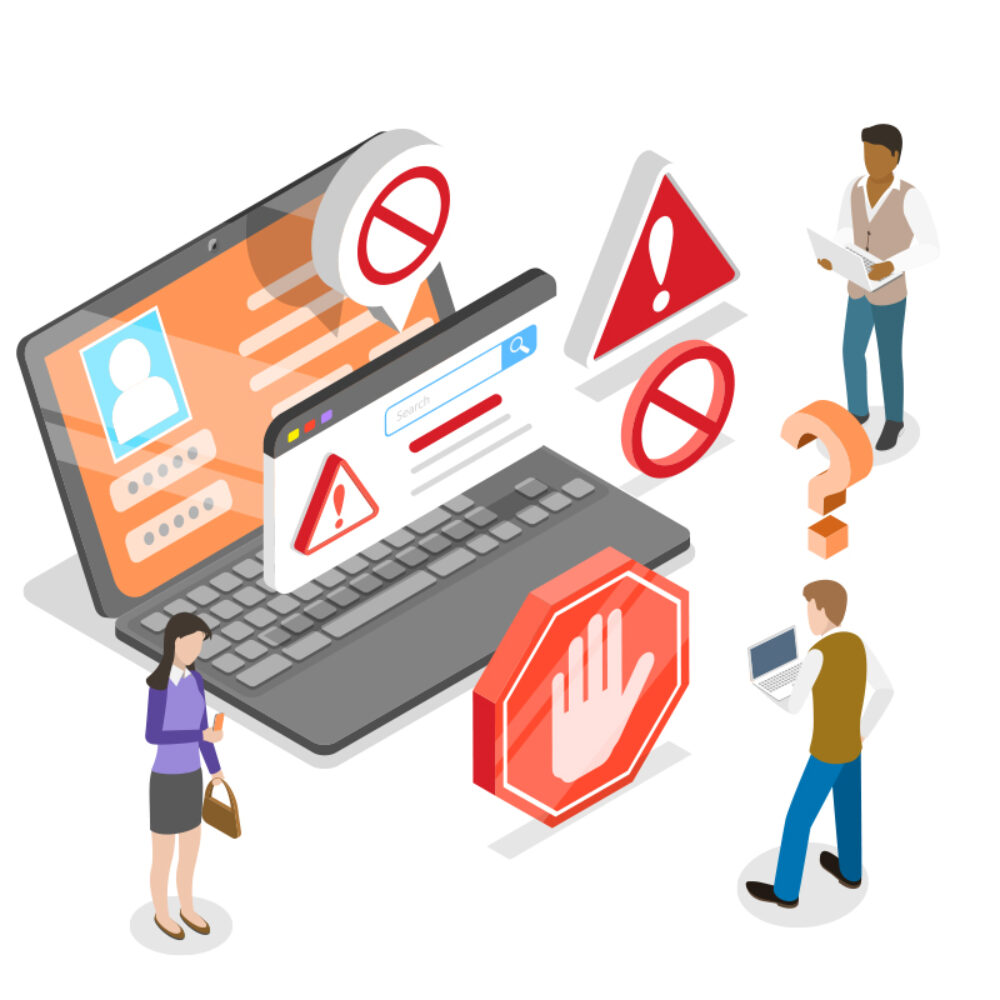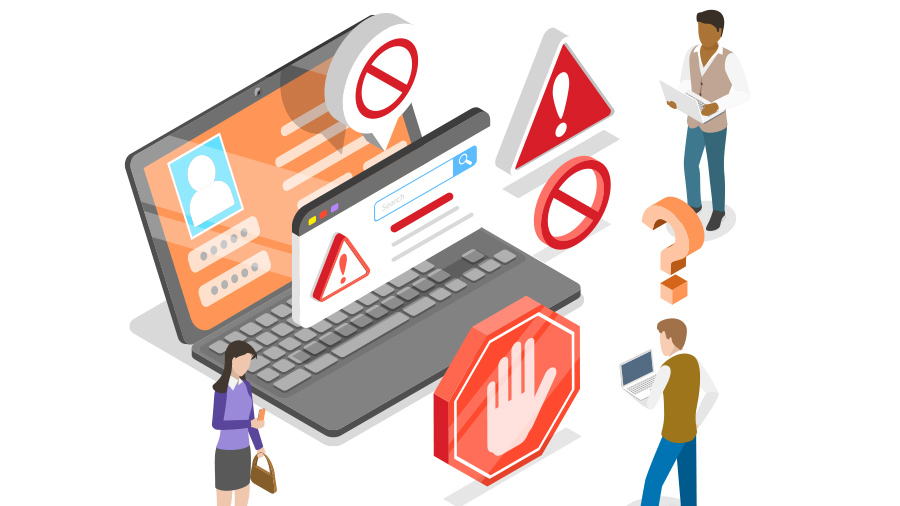Scam-spotters share red flags
How good are you at spotting fakes? Scams can be difficult to detect, so here are some clues to watch for that can help you avoid becoming a victim of fraud.
Key takeaways
- Beware of unexpected calls from “loved ones” who claim to be in danger
- Resist pressure to act immediately
- Be on alert for callers who demand to stay on the phone
- Verify “bank employees” who advise you to wire money
- Rebuff new sweethearts who ask for cash
- Don’t grant remote access to your device

Our branch bankers help spot the ways scammers are targeting customers, including older adults.
Here are six red flags to watch for that may help you avoid becoming a victim of a scam.
1. Unexpected contact
Someone contacts you out of the blue claiming to be a loved one in danger. Look out for scare tactics, insistence on wiring money, and the request to keep the transaction secret.
At a Washington state branch, a customer frantically requested an $8,000 wire transfer to help her son, who she believed was on a last-minute trip to Florida and ended up in jail. Spotting the warning signs for imposter scams, the banker alerted the branch manager.
More red flags popped up as the manager reviewed the wire transfer details, including the beneficiary being an individual rather than a courthouse or bail bonds agency. She suggested the customer contact her son directly to verify the wire. The customer was hesitant and revealed that her “son” asked her not to tell anyone about his situation.
The manager then researched the wire transfer beneficiary, who turned out to be in Texas, not Florida. The customer finally reached her son, who verified that the person who contacted her was a scammer.
2. Everything is urgent
Someone is rude or pressures you with pushy language. Look out for demands that you act immediately.
An older customer came into a branch in Pennsylvania accompanied by a young woman he introduced as his significant other and asked the banker about initiating recurring transfers from his account to the woman’s account.
Because the woman was doing most of the talking, the banker respectfully said she needed to confirm account specifics with the gentleman directly, since the woman was not listed as a joint owner. More red flags continued to pop up throughout the interaction, including the man’s out-of-state driver’s license, his hesitancy to answer questions, and the woman’s demands to have large sums transferred from his account into her bank account every week.
When the banker said she was unable to fulfill the transfer request, the woman asked instead to take money out of the man’s IRA brokerage account and deposit it to her personal account. Due to the woman’s relentless pressure and unnecessary urgency, the banker knew something was not right. She engaged her associates to assess the situation and help protect the customer.
3. Caller demands to stay on the phone
Someone from a “government agency” calls you with instructions on how to send money to correct an issue then demands to stay on the phone, even as you go to the bank. Look out for unusual or unreasonable requests.
A customer came into a Florida branch to make a $10,000 cash withdrawal. Reviewing the account, the manager saw that the customer had already withdrawn $9,640 from her checking account and $10,000 from her savings account earlier that day at another branch. As the manager asked the customer why she wanted to withdraw that much money in cash, she noticed there was an active call on the customer’s cell phone — someone was listening to them. She explained loudly that due to the unusual activity on the account that morning, the customer would have to wait to make an additional withdrawal per the account policy.
After further conversation with the customer, the manager learned that the person on the phone claimed to be a “government official” and was using threats to get the customer to send him the cash. The manager explained to the customer that she was being scammed. When asked where the $19,640 was, the customer revealed a shoebox full of cash. The manager helped her deposit the money back into her account. The customer was grateful for the assistance because she was convinced that she needed to hand over the cash or she would be arrested for failing to comply with government orders.
4. Impersonating bank employees
Someone alerts you to suspicious charges on your account and tells you to send money to a new account to fix the problem. Look out for out-of-the-blue contact, instructions on what to do and say, and insistence on wiring money.
A customer in a Pennsylvania branch was adamant about wiring $29,000, even though the banker explained that the details associated with the wire request sounded fraudulent. Sensing a scam in progress, the banker quickly alerted his associates, and the branch team decided not to approve the wire.
Later, the customer shared he had received an email from the “bank” stating his account was being charged and if this was a mistake to call them, which he did. The person he called told him that someone got a hold of his bank account information and that they would help him. The customer relayed that the scammers calmly and patiently spent more than three hours on the phone with him. The customer believed that he needed to move the money from his old account, which supposedly had fraud, to a new account. The scammers also coached him on what to say at the branch.
The customer was so thankful to the branch team for protecting his funds and pointing out how to spot scam email.
Remember: Banks will never ask you to send a payment or turn over your debit card to stop fraud.
5. Romantic “emergency”
A new online love interest bombards you with sweet talk but doesn’t seem to want to meet in person. Suddenly a hardship or emergency strikes, and they ask you to send them money right away. Look out for pressure to act immediately and to provide your financial information.
When a customer shared that she had to send funds to her fiancé who kept calling and asking for money, an Arizona branch manager determined that the customer had been involved in romance scams for months and had shared her account information, card numbers, and passwords. She had already given a large amount of money to a “film director in South Africa,” an “oil rig financier,” and an “bitcoin investor” — all in the guise of being her “fiancé.”
As the customer was talking, the manager noticed the “fiancé” was persistently calling the customer’s cell phone, asking for the money. She was concerned that the customer was being harassed by a scammer and called police to help.
“We reset the customer’s passwords and alerted her of the red flags of sweetheart scams,” said the branch manager.
6. Asking for access to your device
You call what you think is a tech support number, and the “representative” asks for remote access to your computer to “fix” a problem. Look out for a request to wire money or for account access in exchange for customer service help, as well as coaching on what to say to your bank.
A visibly distressed customer claimed her brother-in-law had accidentally sent her a large sum of money, but mistakenly added two additional zeros, and she was in a hurry to return the money to him. The Texas branch banker sensed something was amiss and asked her how she planned to send the money. The customer said that because of the transfer limit on the Wells Fargo app, she needed to do a wire transfer.
The banker immediately saw the red flags. He confirmed that a sizeable transfer had indeed been made to her checking account, but it wasn’t from an external source. It was an online transfer from the customer’s savings account to her checking account. He also noticed the wire instructions were in Chinese and directed to banks in China.
When the banker informed the customer of the scam, she couldn’t believe it. She admitted she had lost access to her streaming service account and called what she thought was the support line, a number she found online. The scammer convinced her to grant him remote access to her computer to “fix” her streaming account. He then manipulated her online banking and transferred the money from her savings to checking. The scammer had coached the customer to stick to the story that the money was for her brother-in-law when dealing with the bank.
The banker contacted the online fraud team, who suspended the customer’s online banking access, and recommended she immediately change her username and password before reactivating her access.
What to do if you think you’ve been scammed
- Slow down and take a breath. If someone pressures you, confirm that the urgency is necessary.
- Think it through. Does the request make sense? If it sounds too good to be true, it probably is.
- Consult with a friend or family member you trust, even if the scammer tells you not to.
- Go directly to the company or bank the scammer claims to be from. Wells Fargo will not initiate a text, email, or call out of the blue asking for personal or account information.
- Call the police or report fraud.
Stay alert
Wells Fargo customers: Using account alerts in the Wells Fargo Mobile® app is a great way to help keep an eye on your accounts so you can contact us quickly if you see anything suspicious.
Learn more about staying on top of your account security.
Read more

Easy ways to prevent check fraud and scams
No, the IRS isn’t texting you, and other things to know about tax fraud and scams
How to tell if your sweet talker is a scam artist









